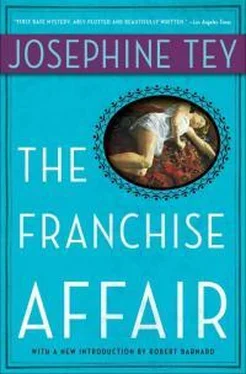“And what was his reaction?”
“He said it was a pity her mother hadn’t done the same thing ten years ago.”
“He was not worried as to what had become of her?”
“No. I was, a bit, until he told me her home was only over at Aylesbury. She could quite easily cadge a lift that distance.”
“So he took it for granted that she had gone home?”
“Yes. I said, hadn’t he better make sure. After all, she was a kid.”
“And what did he say in answer to that?”
“He said: ‘Frankie, my girl, that “kid” knows more about self-preservation than a chameleon.’”
“So you dismissed the affair from your mind.”
“Yes.”
“But it must have come to your mind again when you read accounts of the Franchise affair?”
“No. It didn’t.”
“Why was that?”
“For one thing, I never knew the girl’s name. Barney called her Liz. And I just didn’t connect a fifteen-year-old school-girl who was kidnapped and beaten somewhere in the Midlands with Barney’s bit. I mean, with the girl who was eating chocolates on my bed.”
“If you had realised that the girls were identical, you would have told the police what you knew about her?”
“Certainly.”
“You would not have hesitated owing to the fact that it was you who had administered the beating?”
“No. I would administer another tomorrow if I got the chance.”
“I will save my learned friend a question and ask you: Do you intend to divorce your husband?”
“No. Certainly not.”
“This evidence of yours and his is not a neat piece of public collusion?”
“No. I wouldn’t need collusion. But I have no intention of divorcing Barney. He’s fun, and he’s a good provider. What more do you want in a husband?”
“I wouldn’t know,” Robert heard Kevin murmur. Then in his normal voice he asked her to state that the girl she had been talking about was the girl who had given evidence; the girl who was now sitting in court. And so thanked her and sat down.
But Miles Allison made no attempt to cross-examine. And Kevin moved to call his next witness. But the foreman of the jury was before him.
The jury, the foreman said, would like his lordship to know that they had all the evidence they required.
“What was this witness that you were about to call, Mr. Macdermott?” the judge asked.
“He is the owner of the hotel in Copenhagen, my lord. To speak to their having stayed there over the relevant period.”
The judge turned inquiringly to the foreman.
The foreman consulted the jury.
“No, my lord; we don’t think it is necessary, subject to your lordship’s correction, to hear the witness.”
“If you are satisfied that you have heard enough to arrive at a true verdict – and I cannot myself see that any further evidence would greatly clarify the subject – then so be it. Would you like to hear counsel for the defence?”
“No, my lord, thank you. We have reached our verdict already.”
“In that case, any summing-up by me would be markedly redundant. Do you want to retire?”
“No, my lord. We are unanimous.”
“ W e had better wait until the crowd thins out,” Robert said. “Then they’ll let us out the back way.”
He was wondering why Marion looked so grave; so unrejoicing. Almost as if she were suffering from shock. Had the strain been as bad as all that?
As if aware of his puzzlement, she said: “That woman. That poor woman. I can’t think of anything else.”
“Who?” Robert said, stupidly.
“The girl’s mother: Can you imagine anything more frightful? To have lost the roof over one’s head is bad – Oh, yes, Robert my dear, you don’t have to tell us–” She held out a late edition of the Larborough Times with a Stop Press paragraph reading: THE FRANCHISE, HOUSE MADE FAMOUS BY MILFORD ABDUCTION CASE, BURNT TO THE GROUND LAST NIGHT. “Yesterday that would have seemed to me an enormous tragedy. But compared with that woman’s calvary it seems an incident. What can be more shattering than to find that the person you have lived with and loved all those years not only doesn’t exist but has never existed? That the person you have so much loved not only doesn’t love you but doesn’t care two hoots about you and never did? What is there left for someone like that? She can never again take a step onto green grass without wondering if it is bog.”
“Yes,” Kevin said, “I couldn’t bear to look at her. It was indecent, what she was suffering.”
“She has a charming son,” Mrs. Sharpe said. “I hope he will be a comfort to her.”
“But don’t you see ,” Marion said. “She hasn’t got her son. She has nothing now. She thought she had Betty. She loved her and was as sure of her as she loved and was sure of her son. Now the very foundations of her life have given way. How is she to judge, any longer, if appearances can be so deceptive? No, she has nothing. Just a desolation. I am bleeding inside for her.”
Kevin slipped an arm into hers and said: “You have had sufficient trouble of your own lately without saddling yourself with another’s. Come; they’ll let us go now, I think. Did it please you to see the police converging in that polite casual way of theirs on the perjurers?”
“No, I could think of nothing but that woman’s crucifixion.”
So she too had thought of it as that.
Kevin ignored her. “And the indecent scramble for a telephone that the Press indulged in the moment his lordship’s red tail was through the door? You will be vindicated at great length in every newspaper in Britain, I promise you. It will be the most public vindication since Dreyfus. Wait here for me, while I get out of these. I shan’t be a moment.”
“I suppose we had best go to a hotel for a night or two?” Mrs. Sharpe said. “Have we any belongings at all?”
“Yes, quite a few, I’m glad to say,” Robert told her; and described what had been saved. “But there is an alternative to the hotel.” And he told them of Stanley’s suggestion.
So it was to the little house on the outer rim of the “new” town that Marion and her mother came back; and it was in the front room at Miss Sim’s that they sat down to celebrate; a sober little group: Marion, her mother, Robert, and Stanley. Kevin had had to go back to town. There was a large bunch of garden flowers on the table which had come with one of Aunt Lin’s best notes. Aunt Lin’s warm and gracious little notes had as little actual meaning as her “Have you had a busy day, dear?” but they had the same cushioning effect on life. Stanley had come in with a copy of the Larborough Evening News which carried on its front page the first report of the trial. The report was printed under a heading which read: ANANIAS ALSO RAN.
“Will you golf with me tomorrow afternoon?” Robert asked Marion. “You have been cooped up too long. We can start early, before the two-rounders have finished their lunch, and have the course to ourselves.”
“Yes, I should like that,” she said. “I suppose tomorrow life will begin again and be just the usual mixture of good and bad. But tonight it is just a place where dreadful things can happen to one.”
When he called for her on the morrow, however, all seemed well with life. “You can’t imagine what bliss it is,” she said. “Living in this house, I mean. You just turn a tap and hot water comes out.”
“It is also very educational,” Mrs. Sharpe said.
“Educational?”
“You can hear every word that is said next door.”
“Oh, come, Mother! Not every word!”
“Every third word,” amended Mrs. Sharpe.
Читать дальше
Конец ознакомительного отрывка
Купить книгу












